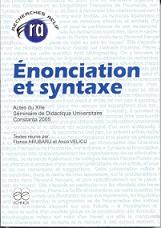O mănâncă limba / la langue lui démange Quelques remarques sur la place du sujet dans les structures possessives en roumain et en français
O mănâncă limba / la langue lui démange. Some remarks on the subject place in the possessive structures in Romanian and in French
Author(s): Corina Cilianu LascuSubject(s): Language and Literature Studies
Published by: Editura Echinox
Keywords: -
Summary/Abstract: The relative order of the phrase constituents is directed by rules unlimited to just one level of analysis. Therefore these rules belong to several linguistic domains, namely morphosyntactic, semantic and pragmatic domains. The place of constituents within the énoncé is determined by the interaction of these factors. Our study intends to analyse this interaction in Romanian and French énoncés where nouns represent the Whole and the Parts (± Alienable). Several parameters are taken into account in order to describe the subject place in the possessive structure: § Semantic features of the verbal constituent representing different verbal classes (inchoative, “negative sensation”, movement classes) and of the nominal constituent referring to the Whole and to the Part (± Alienable) as well as their mutual compatibilities; § Casual markers: syntactic behaviour of Dative/Accusative possessive; § Verbal tense (± Accomplished); § Main sentence or clause; § Thematisation of the Whole or of the Parties, as well as the enunciative and discursive constraints related to the topic and cognitive features related to “centrality” The most important conclusion of contrastive nature is expressed in the more or less constrained choice of the subject in the two languages: if, for these constructions, the subject occupies an antecedent in French, the Romanian language shows a great freedom in choosing the subject place. However, there are some preferences for topics as well as some constraints imposed by the parameters taken into consideration. For this type of constructions, the syntactic-semantic constraints affect the subject place in French, while in Romanian there are no such parameters taken separately which may impose the subject position for sure. Therefore it is the interaction between different parameters within the énoncé which contributes to the “global project of structuring the énoncé by the enunciator” (C. Fuchs, 1997 : 136).
Journal: Recherches ACLIF: Actes du Séminaire de Didactique Universitaire
- Issue Year: 2006
- Issue No: 03
- Page Range: 051-070
- Page Count: 20
- Language: French

